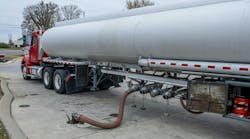You could easily think these are the worst of times for the truck and trailer leasing industry. The Sept. 11 terrorist attacks helped push the economy into a recession, and Class 8 truck and trailer production dropped nearly 50% in just two years.
But if you talk to Dan Driscoll you might change your mind. He represents a sea change in the way fleets view leasing. As chief financial officer for Western Nevada Supply Co., a Reno-based plumbing wholesaler, Driscoll switched from buying to leasing vehicles in 1995 to cut operating costs.
“We had a classic fleet setup,” Driscoll explains. “We'd owned the fleet forever and had our own maintenance shop. Yet we were burdened with the cost of operating the shop and stocking it with parts. Not to mention the cost of downtime. “To justify ownership, we were running our trucks into the ground; as they piled on the miles, our downtime problem grew worse,” he adds. “When our trucks were in the shop we couldn't meet our customers' schedules. It was an unacceptable situation.”
By switching to leased equipment, Driscoll achieved a range of cost savings. “We compared the cost of full-service leasing to what we were paying to keep our current fleet running. The numbers were clear: Operating costs decreased by 5% to 10%,” Driscoll says.
Driscoll points out that leasing also provides a tax advantage because the cost of a vehicle can be deducted on a monthly basis. “In addition, we have the advantage of predicting operating costs; we don't have to try and estimate unexpected expenses such as emergency road service and vehicle rentals.”
Full-service leasing also enables Western Nevada to outsource some of the more expensive aspects of running a fleet, including vehicle maintenance, while still retaining complete operational control. The fleet leases Peterbilt Class 8 tractors and a mix of pickups and one-ton flatbed trucks from PACCAR Leasing Corp.'s franchise in Sparks, NV, which operates a 24-hr. maintenance facility.
“The customer's viewpoint is the same whether you own or lease your vehicles,” says Driscoll. “The same people are driving them and unloading them. Full-service leasing has saved us countless hours of downtime, cut our operational costs, and allowed us to improve the service we offer the customer.”
CRITICAL SHIFT
Western Nevada's use of leasing as part of an overall business strategy represents a critical shift in the way fleets think about this option, says Tracy Leinbach, exec.-vp of fleet management solutions for Ryder System.
“What's changed the most about the leasing business is that there's more demand for a broader range of services and more demand for flexibility in terms of how customers use those services,” she says. Leinbach points out that fleets are rethinking not only how they can use lease-financing to acquire equipment, but also what other services they can tap into as part of the lease contract.
“Fleets that use leasing also want more help in the rest of their business — with safety training and programs, insurance, and even logistics services such as help finding backhauls and dedicated contract carriage,” she explains.
AT YOUR SERVICE
“The challenge is no longer to unbundle services, i.e., let fleets pick and choose off of a menu, but to re-bundle those services into customized packages to meet specific needs.”
A key indicator of that shift may be found in the growth of full-service leases for trucks and trailers — contracts that include a variety of supplied maintenance services along with the equipment — rather than the strict lease-finance arrangements that were more common in the past.
A study conducted for the Equipment Leasing Assn. of America (ELA) by MacKay & Co. found that 17.3% of all Class 8 trucks are under full-service lease arrangements, while 8.9% are in finance-lease contracts. For Class 6 and 7 trucks, full-service contracts rise to 18.7%, with 4.4% in finance-lease arrangements. For trailers, the difference is even more pronounced: full-service leases account for 22.8%, vs. 8.1% for finance leases.
Don Metcalf, lease product manager for Penske Truck Leasing, says that the growth of full-service leasing reflects the fact that fleets now view leasing as part of an overall business strategy. Many lease customers begin as commercial rental customers and then become logistics customers,” he explains. “At the same time, many of our logistics customers have also become leasing customers.”
Metcalf adds that customers are also looking for more online communication options, seeking Internet services that provide direct and immediate access to billing and maintenance records, for example. Fleets also want technology that drivers can use for trip reporting and fuel use tax, Metcalf says.
Despite the availability of broader services, leasing is still experiencing the impact of the economic retrenching that has been going on since late 2000. But there is one silver lining. According to Ralph Petta, director of communications for ELA, many fleets have been forced to explore new ways to reduce financial risk. That's doing a good deal to boost leasing's profile.
“We're finding that now, more than ever, businesses don't want to take on the risk of owning equipment,” Petta says. “They want to use equipment to achieve core business goals, but put the the risk of owning and maintaining it onto someone else's shoulders.”
In trucking, small fleets and private carriers are the primary customers for leased equipment. Private carriers traditionally have been the main stay of the truck renting and leasing industry because they have a core business other than trucking that requires investment capital.
But for-hire carriers are also getting into the mix. Truckload (TL) fleets in particular are now looking to the leasing industry for vehicle maintenance services, says Ryder's Leinbach. “In the 1990s, many big TL fleets went to shorter ownership cycles so they wouldn't have to invest as much in vehicle maintenance,” she says. “With the economy in a downturn, however, those fleets are trying to extend the life of their equipment and are finding themselves under-invested in maintenance facilities. That's why contract maintenance services have become a huge growth area for us.”
William J. Ford, president and CEO of National Truck Leasing System (NationaLease) adds that the for-hire interest in leasing is trickling down to regional trucking firms, too. “Guaranteed maintenance contracts are becoming a much larger percentage of our business, especially for smaller regional trucking companies, when it comes to managing warranty claims,” he says.
“Full-service leases translate into a fixed cost per month for a fleet, which allows them greater control. Extending that monthly fixed cost to maintenance for equipment the fleet already owns helps in a similar fashion.”
From that perspective, says Ford, the glut of used trucks on the market may actually represent an opportunity for leasing vendors. “There are a lot of used vehicles on the market at low miles and attractive pricing,” he says. “We see a significant number of carriers turning to leasing companies for long-term maintenance contracts on that equipment. [Used trucks] can be a great area to work in because some of their warranties may still be in place.”
LOOKING PAST PRICE
The key, says Leinbach, is that fleets — large and small, private and for-hire — are looking past the price of the truck to what the real overall cost is in terms of maintenance, disposal, downtime, etc.
“Take drivers, for example,” she says. “How drivers operate a fleet's equipment has an impact on vehicle maintenance. Safety is another issue. Accident rates affect insurance rates, deductibles, and even whether a fleet can get insurance at all. As a company that provides logistics and dedicated contract carriage services as well as leasing, we can offer fleets a variety of ways to cut vehicle costs.”
Consequently, many leasing companies are broadening the number of services they offer fleets to tap into all the areas that affect overall vehicle costs, says Mark Murfin, senior vp-sales and marketing for Ruan Transportation Management Services.
“We see the need for a much wider variety of services across the whole transportation spectrum, not just in leasing,” he says. “That means contract maintenance and rental options to handle peak demand during the year, but also logistics and even freight brokerage services.”
The tough economic climate means that more fleets are willing to challenge the status quo in order to reduce both the cost and risk in their operations, says Leinbach. “It's a matter of survival. Many fleets are rethinking their options in the face of the current downturn; that means they're taking many ‘sacred cows’ off the table,” she explains.
“Whether it's full-service leasing, maintenance contracts on owned equipment, or even driver recruitment and screening services, fleets are becoming much more savvy in terms of looking at what affects the overall cost of their equipment,” Leinbach points out. “That's why leasing is gaining more respect and more visibility.”
The trailer side
The trailer leasing and renting industry is blazing some new paths to help fleets get more than their money's worth out of trailer assets. ”Over the past two years we've worked on how we, as trailer providers, can better fit into the supply chain for shippers and transportation companies alike,” says said Bill Franz, president and CEO of XTRA Lease.
”We've realized that trucking companies and shippers are looking for information providers, not trailer lessors. They want to know where their trailers are, where they're going and what's in them,” he says.
”Right now, the trailer-to-tractor ratio in the truckload industry is roughly 4-to-1. If we can give carriers and shippers real-time information that allows them to cut that ratio to 3-to-1, we'll be able to provide a huge cost savings. That also makes us a more vital partner in their operations.”
Chris Hines, president of Transport International Pool (TIP), adds that becoming more of a service partner to carriers, rather than just a provider, is another example of how trailer leasing firms and their customers are trying to rethink their relationship.
Look at mobile trailer maintenance, for example, says Hines. ”We've found that customers say ad-hoc trailer road service is a major cost and downtime issue. There's no consistency in billing or in the quality of the repair on a national basis.”
TIP has taken its 120 branches and created mobile service depots that can service customer equipment anywhere on the road. And this includes equipment that is leased from TIP, leased from someone else or owned by the fleet. The program, which TIP started last year in the U.S. and Canada, and plans to set up in Mexico as well, is part of an effort to expand the standard cost structure of TIP's trailer shops to road calls.
”Trailer services are becoming more key than the trailers themselves,” says Hines. “Let's face it — if a carrier plans a monthly trailer rental cost of $300 and then gets a $700 road call repair fee, it blows their cost structure. That's why we think mobile service has a lot of potential.”
Franz adds that mobile service and real-time, Internet tracking data is all part of a dynamic shift in the business of trailer leasing.
“We are trying to focus more on logistics than assets,” he explains. “It's not about providing assets anymore. It's about providing information and services so fleets can manage those assets more efficiently, and at a lower overall cost.”
See this story and more online at www.fleetowner.com


